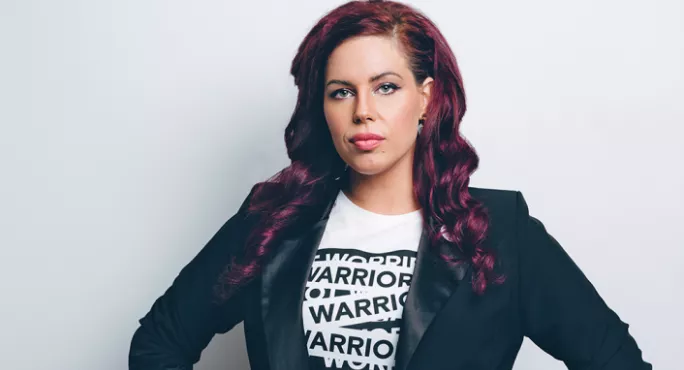- Home
- How to spot the signs of an abusive friendship
How to spot the signs of an abusive friendship

As protests about compulsory LGBT education rage on, the other aspects of the new sex and relationship education (SRE) curriculum – due to be introduced by 2020 – have been somewhat overlooked.
I, for one, really hope there will be some consideration of abuse within relationships. In 2015, laws in England and Wales were changed to reflect our new social understanding of the nature of abuse and to encompass psychological and emotional aspects. Just this week, Scotland introduced a ground-breaking new law which means that "coercive control" is now a criminal act – including any controlling or threatening behaviour that robs the victim of their autonomy. Police officers in Scotland are receiving training that will help them spot the signs.
I recently read Melanie ‘Scary Spice’ Brown’s autobiography Brutally Honest. It’s an important, if difficult, read – not least because Mel has ADHD and writes how she thinks, which means the reader is transported swiftly and without warning between different scenarios and time periods. At the end of the book, Melanie, who was in an abusive marriage for more than a decade, lists the signs a person should look out for that would indicate they are in a toxic relationship. These include showing extreme jealousy, isolating you from your family and controlling the amount of money you spend.
While good advice, this is rarely how abusive relationships start. By the time these behaviours begin to emerge, the victim is usually so embroiled and brainwashed, their chances of leaving are already significantly diminished.
I’m often asked by teachers how to teach young people about healthy friendships. Particularly, although not exclusively, among girls in Year 9 (for some reason), friendship dramas tend to dominate a good portion of the academic year. Having been in more than my fair share of toxic friendship dynamics myself, I began to write a list of the warning signs a young person might look for to indicate a friendship wasn’t healthy. As I did so, I realised it had a lot in common with the warning signs a person might use to indicate a romantic relationship would likely become abusive. I reached this conclusion based on my time volunteering in domestic violence refuges and having a particular interest in how abusive relationships begin when talking to victims.
Here is what I have come up with, so far:
- The friendship will often develop at a time when you feel vulnerable for some reason – perhaps another close friendship has just come to an end, you are being bullied or you have problems at home. Your new friend will swoop in and make you feel special at a time when your confidence is low.
- Your friend will enjoy this dynamic (that of being your "saviour") and will want to keep you vulnerable. They will therefore spend a lot of time comforting you when things go wrong, but disappear, or give a less than enthusiastic response when your life takes an upward turn.
- Your friend will have had a lot of intense friendships that have gone wrong in a dramatic way in the past. They will tell you about these in a carefully edited way, so that you are left in no doubt that it wasn’t their fault.
- If your friend is annoyed with you, they won’t tell you right away. In fact, they’ll take great delight in punishing you by withholding their company, or not texting as frequently as you are used to, leaving you wondering what you have done wrong.
- When your perceived transgression comes to light, it will often be something you couldn’t have possibly known about, such as accidentally offending them by referring to an aspect of their past they hadn’t yet told you about. You will start to feel like you have to walk on eggshells around them.
- At first, the friendship will be incredibly intense. Your friend will usually have "issues" (which is fine; we all do) but, crucially, they will refuse to seek help for or manage these, instead confiding in you and demanding secrecy or special treatment. They are likely to be very charming and to tell lots of stories in which they emerge looking like a hero. You’ll therefore buy into their self-publicity, believing that they are special and you are less so.
- Toxic friendships are hardly ever completely one-sided. You’ll behave in ways you aren’t particularly proud of, too, because you’ll be confused and upset by the other person’s behaviour. Whenever you think about confronting them, or breaking away from the friendship, you’ll remember that you are not blameless and worry that they will list all the reasons why you are a terrible person.
- Most importantly, your friend could read all of the above and would absolutely not recognise themselves in any of the descriptions.
If a significant number of the above are present, it doesn’t mean the "perpetrator" is an awful person necessarily, just that the dynamic between them and their "victim" won’t bring either party anything positive. The healthiest thing for both of them would be to keep the other at a distance.
I would like to see something along the lines of the above taught in SRE, so pupils can seek healthy friendships and relationships that help them to be the best person they can be.
Keep reading for just £1 per month
You've reached your limit of free articles this month. Subscribe for £1 per month for three months and get:
- Unlimited access to all Tes magazine content
- Exclusive subscriber-only stories
- Award-winning email newsletters


